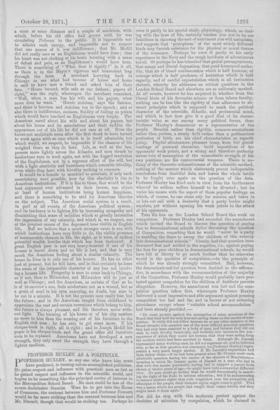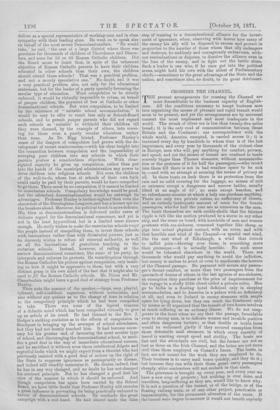PROFESSOR HUXLEY AS A POLITICIAN.
pPOFESSOR HUXLEY, as any one who knew him must have predicted, is turning out an accomplished politician. He gains respect and influence with practical men as fast as he gained respect and influence in the scientific world, and begins to be something like the principal centre of interest in the Metropolitan School Board. No man could be less of the severe doctrinaire theorist. Were he to get into the House of Commons, the contrast between him and Professor Fawcett would be far more striking than the contrast between him and Mr. Disraeli, though that would be striking too. Perhaps he --- owes it partly to his special study, physiology, which, as deal- ing with the laws of life, certainly teaches you not to be too fastidious in choosing the sort of nutriment you will assimilate, and suggests that protoplasm ' of the most widely different kinds may furnish substance for the physical or moral tissues of the consumer. Perhaps he owes it partly to his early experience in the Navy and the rough incidents of adventurous travel. Or perhaps lie has inherited that genial peremptoriness, that sunny and liberal dogmatism, that good-humoured autho- rity, that air of bland condescension which is half humour, of courage which is half prudence, of hesitation which is half sagacity, and of candid expostulation which is all instinctive rhetoric, whereby his addresses on critical questions in the London School Board and elsewhere are so uniformly marked. At all events, however he has acquired it, whether from the liberal hints of his favourite science or from inborn faculty, nothing can be less like the rigidity of that adherence to ab- stract principles which is supposed to mark the political character of the scientific, didactic, and professorial mind, and which in fact does give it a good deal of its charac- teristic value as one among many political forces, than Professor Huxley's demeanour as a representative of the people. Breadth rather than rigidity, common-sensioalness rather then purism, a steady drift rather than a pertinacious profession of faith, are his chief characteristics as regards policy. Playful allusionness, pleasant irony, keen but genial readings of personal character, lucid expositions of his opponents' weak points, and a strong and therefore perfectly serene vein of assumption of the unassailable strength of his own positions, are his controversial weapons. There is no- thing of the theoretic exhaustiveness of the scientific method, nothing of the manner which elaborately proves indisputable conclusions from doubtful data, and leaves the whole battle to be fought over again on the question of the data. Professor Huxley has fixed ends in view, from the furtherance whereof he seldom suffers himself to be diverted ; but he varies his means with the aspect of those popular feelings on which, of course, he can alone rely for suocess, and takes in or lets out sail with a dexterity that a party leader might emulate, yet without opening his weak points to the attack of his opponents.
Take his line on the London School Board this week on compulsion. Professor Huxley had seconded the amendment which invited the Board to discuss the question of paying fees to denominational schools before discussing the question of Compulsion, remarking that he would " never be a party to enabling the State to sweep the children of this country into denominational schools." Clearly, had that question been discussed first and settled in the negative, i.e., against paying the fees for poor children in denominational schools, he would have felt at liberty to go much further than he otherwise would in the question of compulsion,—to the principle of which he was already strongly committed. Had, however, the denominational-fee question been decided in the affirma- tive, in accordance with the recommendation of the majority of the Committee, Professor Huxley would probably have pro- tested against compulsion for the children of destitute parents altogether. However, the amendment was lost and the Com- pulsion question taken first, whereupon Professor Huxley delivered a most impressive and able argument against pressing compulsion too fast and far, and in favour of not enforcing attendance except where " suitable school accommodation " had been already provided :— " He must protest against the assumption of some members of the Board that they held the only true and saving views on this matter of com- pulsion. It really did not follow because he or any other member of the Board thought that question one of the most difficult practical questions that had over been remitted to a body of men, and because they did not wish to rush blindly, fanatically, and foolishly into measures the con- sequences of which they could net foresee, that they were acting from the motives which had been ascribed to them. Although Mr. Lueraft represented many working-mon, he did not represent all, and he believed that, so far as that question was concerned, ho (Professor Huxley) repre- sented a very much larger section. If Mr. imeraft's experience had been rather wider,—if he had been present when Mr. Cromer made such admirable speeches during his canvas of the electors of Marylobone- speeches in which Mr. Cremes spoke of himself as a 113411 who had to deal with this matter practically, having had to support a parent from eleven or twelve years of ago—he might have held a somewhat different view. No man would go farther than he would theoretically in assert- ing the right of the State to enforce education ; but if in endeavouring to enforce abstract rights they rode roughshod over the necessities and affections of the people, their abstract rights might come to grief. That was a loam which the people had taught their rulers before, and they might teach it them again."
Nor did he stop with this moderate protest against the doctrine of salvation by compulsion, which he claimed to deliver as a special representative of working-men and in close sympathy with their leading aims. He went on to speak also on behalf of the most severe Denominationalists. " He would take," he said, " the case of a large district where there was provision for thousands of children of Churchmen and Dissen- ters, and none for 50 or 60 Roman Catholic children. Did the Board mean to insist that, in spite of the vehement objection of Roman Catholic parents to have their children educated in other schools than their own, the children should attend those schools ? That was a practical problem, and not a merely speculative one." No doubt, and it was a very practical problem also, not only for the educational statesman, but for the leader of a party specially favouring the secular type of education. Were compulsion to be strictly enforced, it would be virtually impossible to refuse, on behalf of pauper children, the payment of fees at Catholic or other denominational schools. But were compulsion, to be limited by the existence of " suitable school accommodation," it would be easy to offer to remit fees only at School-Board schools, and to permit pauper parents who did not regard such schools as 'suitable' to withhold their children till they were shamed, by the example of others, into covet- ing for them even a purely secular education rather than none. As Dr. Rigg hinted, Professor Huxley's sense of the dangers of compulsion had grown with the de- velopment of recent controversies,—with his clear insight into the connection between compulsion and the impossibility of sweeping poor children into any schools to which their parents profess a conscientious objection. With clear- sighted sagacity he gives up compulsion, rather than put into the hands of the municipal administration any power to drive children into religious schools. Not even the children of the well-to-do, whose fees at schools of their own faith -could easily be paid by their parents, would he have compelled to go there. There must be no compulsion, if it cannot be limited to unsectarian schools. Compulsory knowledge would be good, but the attendant denominationalism would far outweigh its advantages. Professor Huxley is farther-sighted than even the shrewdest of the Birmingham Leaguers, and has a keener eye for the breakers ahead. Moreover, his political touch is more delicate. His blow at denominationalism is delivered under cover of delicate regard for the denominational conscience, and yet is not in the least hypocritical, but in a limited sense sincere ,enough. He really wishes to make the unsectarian schools tempt 'the people instead of compelling them, to invest these schools with fascinations rather than with dictatorial powers, just as he sincerely wishes to refuse all external authority, as well as all the fascinations of gratuitous teaching, to the sectarian schools. Instead, however, of railing at the narrow denominational conscience, like some of his party, he interprets and enforces its protests. He ventriloquizes through the Roman Catholics his protest against compulsion, only insist- ing on how it might be oppressive to them, but with a very distinct grasp in his own mind of the fact that it might also be used to fill the Roman Catholic schools. Mr. Dixon and Mr. Chamberlain might learn a good deal of strategy from Professor Huxley.
Then note the manner of the speaker,—large, easy, playful, tolerant, self-confident, sagacious, without acrimonies, and also without any qualms as to the change of tone in relation to the compulsory principle which he had been compelled to take. There was none of the logical remorse
of a didactic mind which has been compelled virtually to give lip an article of its creed. He had listened to the Rev. J.
Rodger's striking statistics as to the effects of compulsion in 'Stockport in bringing up the averages of school attendance, but they had not keenly touched him. It had become neces- sary for his greater end, of favouring the most secular type -of school, and discouraging the denominational school, to sacri- fice a good deal in the way of immediate educational success, and he sacrificed it without even those intellectual fidgets and regretful looks which we might expect from a theorist who had previously insisted with a good deal of ardour on the right of the State to suppress ignorance as peremptorily as disease, and indeed still steadily maintains it. He denies, indeed, that he has in any way changed, and no doubt he has not changed his abstract principle. But he has changed a good deal his view of the manner in which it should be enforced. And though compulsion has again been carried by the School Board, we have little doubt that Professor Huxley will exercise a great influence in preventing its being practically enforced in favour of denominational schools. He conducts the great campaign with a cool hand. He had almost made the false
step of trusting to a denominational alliance for the invest- ment of ignorance, when, observing with horror how many of the enemy his ally will be disposed to excuse and protect in proportion to the number of those whom that ally endangers and destroys, he suddenly and courageously endeavours, with- out recriminations or disputes, to dissolve the alliance even in the face of the enemy, and to fight out the battle alone. Such a leader is one who, if he once got into the political arena, might hold his own with the ablest of Parliamentary chiefs,—sometimes to the great advantage of the State and the nation, and sometimes also, no doubt, to its great detriment.



































 Previous page
Previous page